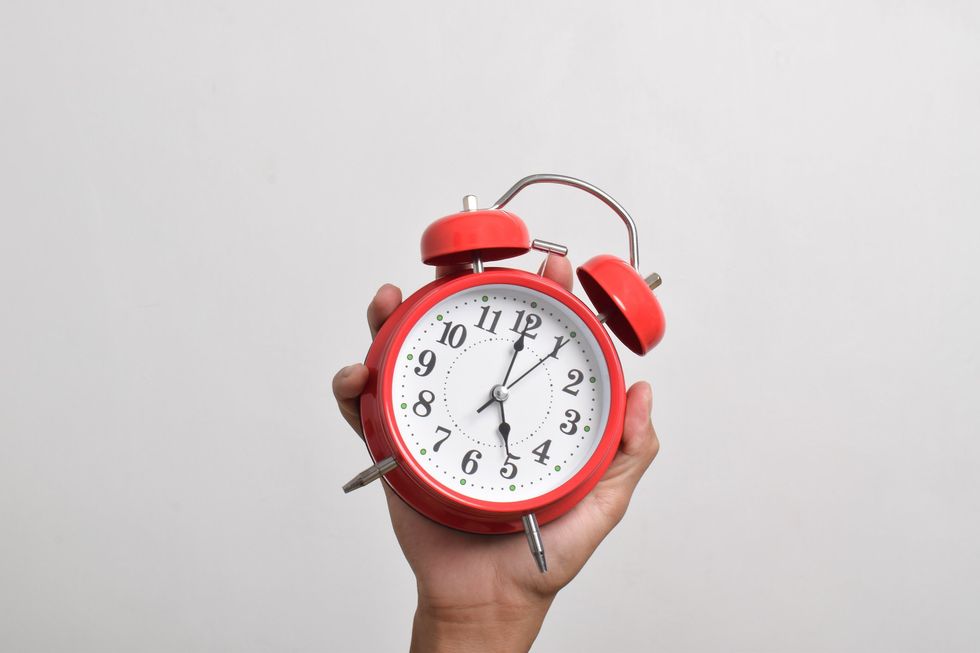A dinner date Monday, stay up and binge-watch your favourite show Tuesday, accidentally work late Wednesday, colleague drinks Thursday, party Friday, and lie in bed for the rest of the weekend.
It's a cycle many of us are familiar with, but using our weekends to slob around could actually be causing us health problems in the form of social jet lag.
Unfortunately, it has nothing to do with coming home from a plush holiday in the sunshine, but rather refers to the shifts we undergo during our weekday vs weekend routines - particularly during seasons where we're staying out later, or making more plans in the nicer weather.
@siffhaider NEW EPISODE ⚡EP231 solo episode WHAT YOU’LL LEARN: — things that I can start doing now in anticipation for my New Year’s resolutions — my current workout split, diet, and sleep routine — my advice on credit card debt — tips for moving in with your partner — so much more Listen to THE DREAM BIGGER PODCAST on all podcast platforms! #tdbpodcast #thedreambiggerpodcast #siffhaider #arraeco #founder #podcast #podcastclips #healthandwellness #femalefounder
What Is Social Jet Lag?
Social jet lag is what you experience when you accidentally mismatch your biological body clock (or circadian rhythm), and your social schedule, tricking your body into the same state it's in when you have real jet lag.
In essence, it’s the difference between when your body wants to sleep and when it has to sleep.
The classic example? Waking up early for work Monday to Friday, then staying up late and sleeping in on the weekend. This back-and-forth creates a kind of internal jet lag, like flying between time zones every week, just without the suitcase.
It’s especially common among young adults and teenagers who frequently stay up late or have less of a routine, but plenty of working professionals experience it too, particularly as we're graced by the lighter evenings.
Not only is it a nuisance, but long-term disruption to your natural sleep-wake rhythm can lead to a range of physical and mental health problems, including fatigue, mood disorders, weight gain, and even increased risk of chronic disease.
"Your body thrives on consistency. When your sleep schedule shifts dramatically each week, say, sleeping from midnight to 7am on weekdays, then 2am to 10am on weekends, your internal clock gets confused", says Dr Seeta Shah, sleep expert for Panda London.

"Hormones like melatonin and cortisol stop syncing properly, which can interfere with sleep quality, immune function, concentration, and mood."
She even says healthcare providers need to start taking it more seriously too.
"Schools and workplaces might consider more flexible start times to accommodate natural circadian differences, particularly for teens and shift workers", she says.
"Healthcare providers should also start viewing sleep timing as a vital sign, just like diet, exercise, or blood pressure. Social jet lag may sound harmless, but it’s quietly affecting the sleep, mental health, and productivity of millions. If you’re constantly dreading Monday mornings, or find it harder to fall asleep after the weekend, your body clock may be out of sync."
So, how can we avoid it without sacrificing our social lives? Dr Shah has some tips...

How to avoid social jet lag
1. Wake Up at a Consistent Time - Even on Weekends
"Consistency is key. Try to keep your wake-up time within one hour of your weekday routine, even on weekends.
"A Saturday lie-in until noon may feel luxurious, but it can derail your sleep for days. Keeping mornings predictable helps regulate your internal clock, making it easier to fall asleep at night and wake up refreshed."
2. Get Natural Light First Thing in the Morning
"Light is the most powerful signal to your circadian rhythm. Exposing your eyes to daylight shortly after waking helps reinforce your body’s sense of time.
"Open the curtains, go for a walk, or have your morning coffee outdoors , especially if you’re trying to shift your sleep earlier. Even 10–15 minutes can make a difference."
3. Develop a Wind-Down Routine That Starts Before Bedtime
"If you regularly struggle to fall asleep, the problem may begin long before your head hits the pillow.
"A consistent bedtime routine, like reading, stretching, or having a warm shower, can cue your brain to start winding down. Crucially, this helps reduce the temptation to “catch up”on TV or social media late into the night, especially on weekends."
4. Avoid Oversleeping as a Form Of 'Catching Up'
"It’s a common myth that you can repay sleep debt by sleeping in for hours at the weekend.
"Unfortunately, oversleeping disrupts your rhythm and often leads to more trouble falling asleep Sunday night, the start of what’s known as 'social jet lag hangover'. If you’re tired after a poor night’s sleep, a short daytime nap is a better solution."
5. Keep Track of Your Sleep Patterns
"Awareness can lead to change. Use a simple sleep diary or a sleep tracking app to spot patterns in your bedtime, wake time, and sleep quality.
"This can help you see how much your routine shifts over the week, and motivate you to make adjustments. Even small improvements in consistency can have big benefits."
6. Limit Weekend Alcohol and Late-Night Eating
"Alcohol and heavy meals can delay your body clock even further. A Friday night out with drinks and a midnight takeaway might feel fun at the moment, but it can interfere with sleep onset and REM cycles.
"Try to enjoy social time earlier in the evening where possible, and allow at least 2–3 hours between eating and going to bed."
7. Ease Into Major Schedule Changes Gradually
"If you're returning from holiday, switching shifts, or preparing for back-to-school routines, avoid abrupt changes.
"Shift your bedtime and wake time by 15–30 minutes each day in the lead-up to the change. Your circadian system needs time to adjust, just like it does after flying to another country."
8. Understand Your Chronotype - and Work With It
"We all have different internal clocks. Some people are natural early risers ('larks'), whileothers are more alert at night ('owls').
"Understanding your chronotype can help you make realistic adjustments. If you’re a night owl, for example, shifting your bedtime slightly earlier over time is more sustainable than trying to suddenly become a morning person."
Why not read...
Isn't it about time we stopped glorifying TikTok's almond moms?
Is eating placenta actually good for you? Doctor weighs in following Calvin Harris controversy
Have your say in our news democracy. Click the upvote icon at the top of the page to help raise this article through the indy100 rankings














